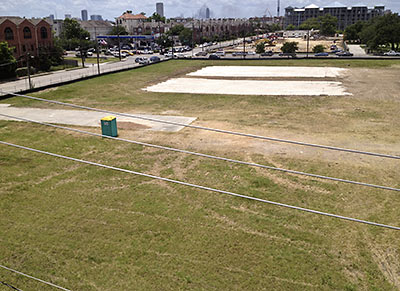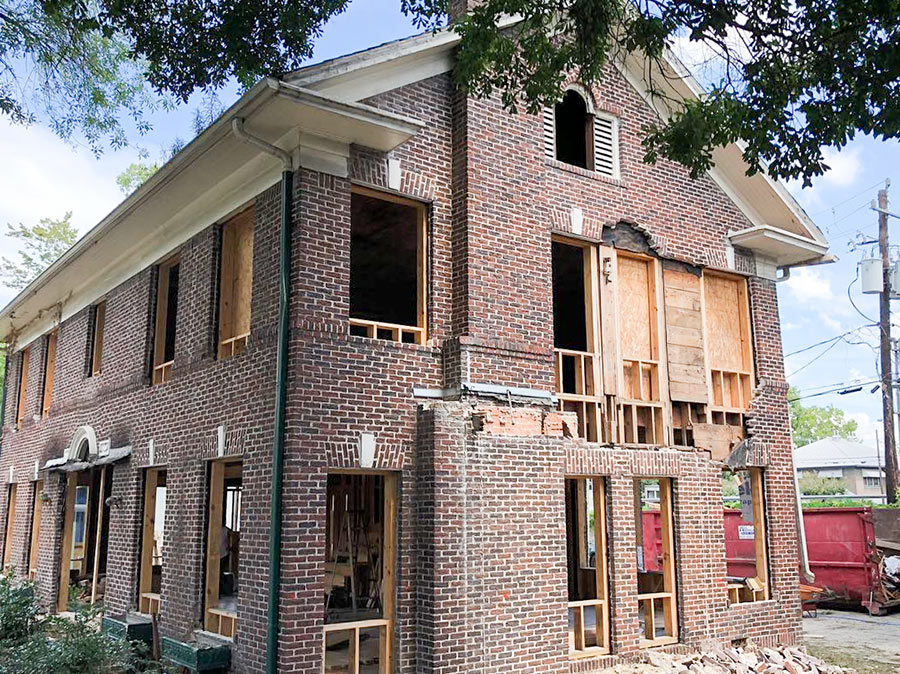
It doesn’t seem that this grassy, fenced-in lot along Montrose between W. Dallas and Allen Pkwy. is going to change very much: All that scraping and dragging a few weeks ago was to level the ground for a cricket field, according to a contractor at the firm responsible for doing the dirt work. The Aga Khan Youth and Sports Facility, the contractor says, will comprise that cricket field, a pair of soccer fields, and a concession stand. In 2006, the Aga Khan Foundation purchased and demolished the Robinson Warehouse on this frequently flooded 11-acre property and said it was planning to build an Ismaili Center here.
- Previously on Swamplot: What’s Going On at Montrose and Allen Pkwy.?, Hark, a Fence!, Zero Tolerance for the New Buffalo Bayou Bridge
Photo: Allyn West





Credit to Kokatat who called it in Comment #2 in the previous article.
This, as discussed, obviously has to do with property tax strategy in the interim, while the developers put together plans and capital for the Ismaili Center.
The Aga Khan Foundation doesn’t need to put together capital. It provides its own capital. And has lots of capital.So there’s something else behind the delay.But obviously it’s better to use the land than to pay taxes on it and let it sit empty. A little game of cricket might not be so bad. Might add some real culture to our little cow town.
it’s under utilizing this land, and depriving the City of significant tax revenue even as is.
I don’t know, I’d rather this than whatever the so called “Aga Khan” plans to build–I wish he’d sell it and someone build a high end condo tower
The Aga Khan Foundation probably has assets in the BILLIONS! Per Matt Mystery’s comments, there is something else behind the delay.The Aga Khan Foundation is waiting for development /permit approvals.I have a gut feeling an edifice will rise out of that cricket field within a year or two.
I don’t believe the Aga Khan Foundation has billions–where do you get this information-the Aga Khan is hardly a Saudi Royal
It’s a mistake to put the land to use if the ultimate plan is something else. People will get attached to the fields…do not giveth and then taketh away.Otherwise, the area could use some playing fields.
Playing fields are not necessarily inconsistent with additional uses – the part closer to Allen Parkway floods in a heavy dew.
“I don’t believe the Aga Khan Foundation has billions–where do you get this information-the Aga Khan is hardly a Saudi Royal.”
The current estimate of the imamate is around $13 billion although that is just an estimate. It’s probably much more than that given the amounts the foundation has spent building the various centers and the museum in Toronto and the various projects of the development network. Suffice it to say he doesn’t need to seek out funding for projects. He just writes a check.
http://www.vanityfair.com/society/2013/02/aga-khan-spiritual-leader-multi-billionaire
All churches should pay taxes, especially property taxes.
Agreed; start with Lakewood and Mr. Smiley.
bernard is right, and i would even conceed property taxes on their core operation sanctuary if needs be…but NO WAY on any ancillary operations or NOT operations they might just happen to own and throw under their 503-C status. this means ball fields, grounds, and certainly if they own a shopping center or apartment complex for strategic reasons (this means you, Ed Young). Absolutely bogus.
i live in the heights and saw curb repair being done at a church — even BIGGER no way. i pay ridiculous property taxes on my home, and get zip from the city. these dudes get a permanent zero in taxes, they should get zero.
Everything should pay property taxes, even HISD.
at least property taxes on the land value, if not the structures.
Aga Khan, Chaka Khan, and all the For Profit Churches should pay taxes like any other business. They collect fees from clients (members) for telling them entertaining stories and pay huge salaries to the top brass and amassing assets within the entity. I bet Exxon spends more money on community reinvestment than Lakewood or 1 through 18th Baptist Church combined.
“A little game of cricket might not be so bad. Might add some real culture to our little cow town.”
Right, because baseball, football, basketball, etc. aren’t “real culture.” Only sports not invented in America are “real culture.”
Woo-hoo, everyone agrees on making churches pay taxes! What a mini secular revolution we have right here on our swamplot thread. Liberte, Egalite, Fraternite!
Perhaps to forestall this revolution churches might consider making voluntary payments in lieu of taxes, as does the Nature Conservancy of Texas.
I’m not sure how well it gels with the mission of a church to give money voluntarily to a government when it could be spending the money on the charitable enterprises that are a part of its mission.
Also, since pastors always try to influence which way for their members to vote, and threaten them with being ostracized if they vote differently, then they should most definitely lose their non-profit status.
“Also, since pastors always try to influence which way for their members to vote, and threaten them with being ostracized if they vote differently, then they should most definitely lose their non-profit status.”
Always? Not in my experience. In many denominations (e.g. Catholic, Lutheran, Episcopalian, Orthodox) the pastor is as likely to be Democrat as Republican, and these together make up perhaps the majority of churches.
#19: And the secular organization also has a rather well-defined mission, so the difference is what?
Secular organizations are welcome to give extra money to the government if they wish. I have no problem with that. But why would you expect a church to give money to the government that it is not required to give? This is puzzling to me.
Let’s puzzle it out. Consider that both the church (or some few churches) and the conservation group pursue aims that, in some respects, government also pursues. Both are non-profit entities. Why then should the Nature Conservancy voluntarily give money to the predominantly rural counties in which it preserves large amounts of habitat? Like the church it would undoubtedly prefer to use the funds it has raised on its own work. The answer is simply that it wishes to be a responsible landowner, and avoid the perception that by taking land off the tax rolls it has starved the local government of revenue.
So it imposes this obligation on itself — to insulate itself from the bad PR the media is always only too eager to provide; and, if you like, for moral reasons. Perhaps if churches received greater scrutiny they might feel compelled to do similarly.
You make an excellent case for a church to donate money to the government. I’m sure everyone will scrutinize churches less if we find out they’re putting Washington and Austin ahead of food drives and prison ministries in their budgets for giving.
I’m remiss in not making clear that, per the Texas Tax Code, the Nature Conservancy’s tax-exempt land “may not
exceed 1,000 acres in any one county.” So there are counties where it pays taxes the old-fashioned involuntary way as well.
I’ve obviously no desire for little tiny churches, whose survival is fraught anyway, to be taxed. And though the many charlatans in the world make me angry, still I vaguely recall from my distant Baptist upbringing Jesus’ injunction not to question whatever people do in His name.
I’d never thought about this at all until mr.l asked me to get ahold of that recent Steven Brill single-article issue of Time magazine. (“Time magazine? You mean like a paper copy of it? You … want to read Time magazine.”) The issue of the church’s non-profit status starts to seem nontrivial — polity-threatening, some would say — in its connection to health care prices:
http://www.bizjournals.com/orlando/blog/2013/03/orlando-hospital-ceo-compensation.html